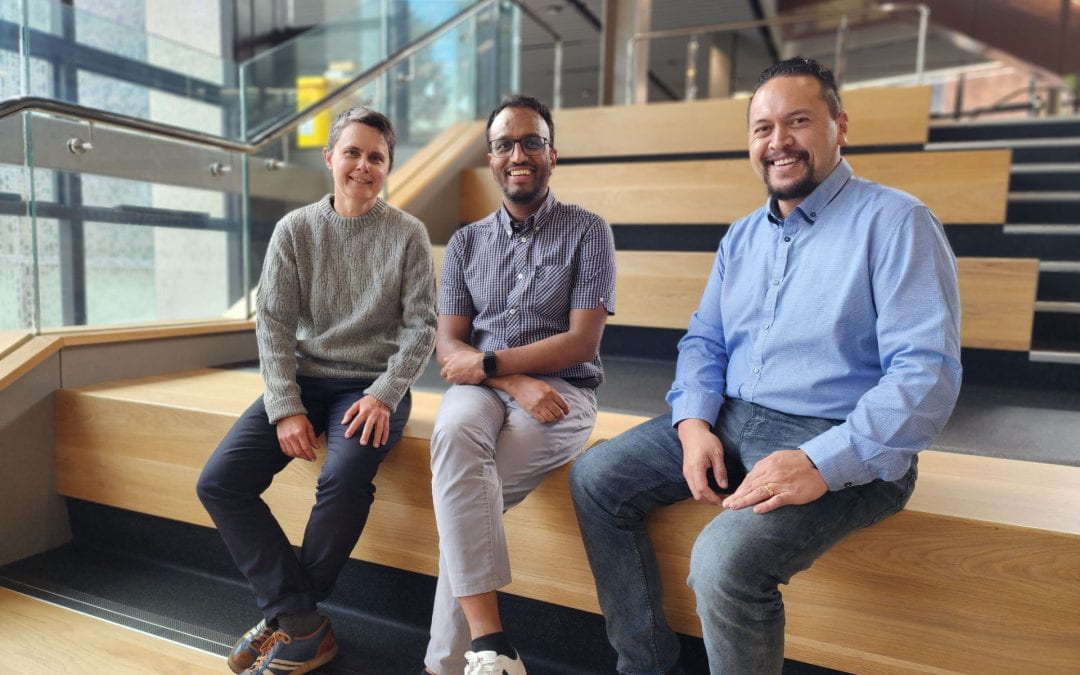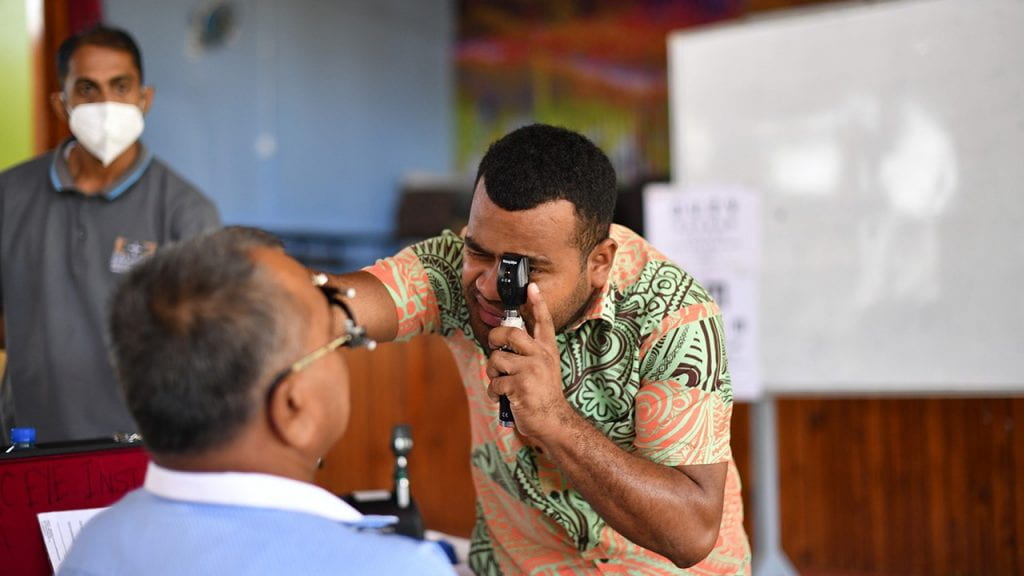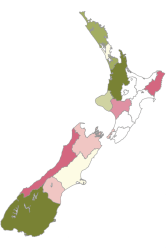
by Lucy Goodman | 13 Dec, 2023 | Eye care services, Resources
 Key messages
Key messages
Limited evidence exists to describe access to eye care in New Zealand. This research has identified two major barriers that make eye health services inaccessible for some people in Aotearoa: the cost, and the lack of nearby services or transport options to reach these services
Read the published paper and download a plain language summary of the findings.
Inequities in eye health
Throughout the world, services systematically underserve some groups of people which leads to worse eye health. In Aotearoa New Zealand, the Ministry of Health has committed to addressing health inequities that are experienced by Māori, Pacific people, and people living in areas with high levels of deprivation. However, this remains a work in progress. For example, New Zealand has very little public funding for eye care services, meaning that eye care is less accessible for people who are unable to pay. Very little evidence is available describing access to eye care in New Zealand. We need this evidence so that we know how to develop services that are more accessible to everyone.
Why did we do this research?
We did this research to better understand the reasons that New Zealand’s eye care services may be difficult to use (the barriers), and ways that services may be made easier to use (the enablers), from the perspective of people who have been historically underserved.
What did we do?
We interviewed 25 people with vision problems about their opinions and experiences using eye care services. The participants all lived in an Auckland suburb that has a high level of social and economic deprivation, and most were Pacific Peoples or Māori.
What did we find?
Barriers to eye care: Most participants reported that the cost of eye care services prevented them from accessing care. Many people had to prioritise other essential costs before eye care. To overcome the cost, some had used a government loan to purchase spectacles, or purchased low-cost, premade reading glasses. Participants expressed the opinion that the government should do more to fund eye care. The distance to services and lack of transport were other commonly reported reasons participants found it difficult to reach eye care services.
Enablers to eye care: Participants were aware that good eye health is important. Some participants chose to see their GP for eye care advice. Some reported using optometry services in the past and described the experience positively. While many participants were unaware of optometry services, they were interested to understand what was involved in an eye examination. The participants also expressed how whānau (family) play an important role in their eye care.
Citation: Rogers JT, Kandel H, Harwood M, et al. Access to eye care among adults from an underserved community in Aotearoa New Zealand. Clin Exp Optom. 2023;1–9. doi: 10.1080/08164622.2023.2291527
Funding: Buchanan Charitable Foundation, The University of Auckland (Faculty Research Development Fund), Blind Low Vision New Zealand, Peter and Rae Fehl, Helen Blake QSM, Barbara Blake, and Essilor New Zealand.

by Lucy Goodman | 18 Jul, 2023 | News
 In May 2023, Renata Watene was honoured as the first International Keynote Speaker at the prestigious National Aboriginal and Torres Strait Islander Eye Health Conference in Parramatta, Australia.
In May 2023, Renata Watene was honoured as the first International Keynote Speaker at the prestigious National Aboriginal and Torres Strait Islander Eye Health Conference in Parramatta, Australia.
Renata is renowned for her work in indigenous eye health in Aotearoa. Her presentation titled “Indigenous Voice from Aotearoa – A kōrero about what we can learn from one another.” was well received by the 240 delegates, including the more than 100 First Nations representatives from all corners of Australia.
The conference served as a valuable platform to promote equitable outcomes for Aboriginal and Torres Strait Islander communities. The conference theme, “Our Vision in Our Hands: Finding Our Voice,” emphasised the importance of emerging and future First Nations leaders while acknowledging our current leaders’ and esteemed Elders’ pivotal previous work.
During her presentation, Renata delved into the similarities and differences between Aboriginal & Torres Strait Islander and Māori cultures, explored the role of Te Tiriti, and highlighted the vital role health practitioners play in achieving equitable outcomes for Indigenous Peoples.
Overall, the National Aboriginal and Torres Strait Islander Eye Health Conference proved to be a momentous occasion, fostering collaboration and understanding among delegates, and paving the way for future progress in achieving equitable outcomes for all.
See here for a detailed summary of the National Aboriginal and Torres Strait Islander Eye Health Conference 2023.

by Lucy Goodman | 18 May, 2023 | Diabetes, Resources
Key messages:
Everyone with diabetes needs regular access to eye services, but these services are not equally accessible to everyone in Aotearoa. Underserved populations include Māori and Pacific people, younger and older age groups (compared to people in their 50s), and those living in areas with higher deprivation. To develop more equitable services we need to collect better information on service access and outcomes for different population groups
Read the published paper and download a plain language summary of the findings.
About diabetes eye care
Diabetes can cause diabetic retinopathy—damage to the blood vessels at the back of the eye, which if not treated can lead to vision loss. Fortunately, regular retinal screening can detect early changes to the retina before vision loss occurs. In Aotearoa New Zealand, retinal screening is provided by the public health system and is usually recommended once every two years. People who develop diabetic retinopathy are referred to ophthalmology services for closer monitoring, or to receive treatment with laser or injections that can slow down the disease.
Why did we do this research?
To understand whether services are accessible to New Zealanders living with diabetes. Our aim was to identify any inequities in access to diabetes services between different population groups.
What did we do?
Using routinely collected data from 14 (of 20) District Health Boards that had provided data to the Ministry of Health, we identified everyone aged 15 years or over with a scheduled appointment at a diabetes screening or ophthalmology clinic between 2006 to 2019. We calculated how often people accessed diabetes eye care appointments, and whether there were any differences between genders, age groups, ethnicity groups, deprivation levels, and regions across Aotearoa.
What did we find?
~250,000 people had at least one scheduled diabetes eye care appointment between 2006 and 2019. Less than two-thirds (62.1%) of people accessed retinal screening every two years (as recommended).
A relatively low number of people never attended any retinal screening (1.5%) or follow-up ophthalmology appointments (0.8%) once they had been scheduled. Approximately 1 in 10 people (9.4%) accessing any diabetes eye care appointments received treatment (either laser or injections) for diabetic retinopathy over the study period.
Compared with NZ Europeans, Māori were about twice as likely to never receive diabetes eye care or to access ophthalmology when referred from retinal screening, and 9% relatively less likely to receive biennial screening. Māori received the fewest anti-VEGF injections when treatment was commenced
What is missing?
The available data had several limitations, which meant we could not estimate:
- How many people were never offered an appointment.
- A population-level national diabetic retinopathy screening rate.
- Outcomes from eye service appointments or barriers to access
Citation: Silwal PR, Lee AC, Squirrell D, et al. Use of public sector diabetes eye services in New Zealand 2006–2019: Analysis of national routinely collected datasets. PLoS One. 2023;18:e0285904. doi: 10.1371/journal.pone.0285904

by Lucy Goodman | 1 Apr, 2023 | News

Buchanan Charitable Foundation Postdoctoral Fellow Dr Pushkar Silwal (middle) pictured with team members A/Prof Jacqueline Ramke (left) and Dr Braden Te Ao (right).
Pushkar Silwal, a member of the School of Optometry and Vision Science’s Community Eye Health team and the inaugural Buchanan Charitable Foundation’s Postdoctoral Fellow hopes that our transforming health system will better support eye care services that are accessible to everyone.
Although 1.1 billion people experience impaired vision globally, eye health is often overlooked as a public health concern. The ongoing health sector reforms that began in mid-2022 provide a unique opportunity for Pushkar and his colleagues to build on previous research findings and generate much-needed evidence on how eye care services can be more accessible and equitable in New Zealand.
In February 2023, Pushkar began a three-year postdoctoral fellowship funded by the Buchanan Charitable Foundation—a home-grown, philanthropic foundation that supports community development. During his Fellowship, Pushkar will undertake a series of research projects that will investigate how to strengthen our health system, with the goal of improving eye care services in Aotearoa. He will also engage with academics, programme managers, and policy makers to identify opportunities to promote the inclusion of eye health in health system monitoring.
“We hope this will allow us to translate the knowledge we generate into practice,” says Pushkar.
This work will follow on from Pushkar’s PhD research, where he examined whether the measures we use to monitor our health system are appropriate. During his Fellowship, Pushkar will maintain an honorary appointment within the School of Population Health and will be mentored by A/Prof Jacqueline (Jacqui) Ramke from the School of Optometry and Vision Science (SOVS) and Dr Braden Te Ao from SOPH.
“We are very excited to have Pushkar commence his fellowship with us and welcome his commitment to generate evidence to support equity-focused decision-making in eye health. We are very fortunate for this ongoing support from The Buchanan Charitable Foundation and thank them for their commitment to improve eye health for all New Zealanders”, says Jacqui.
To advocate for improved eye care, Pushkar will draw on a growing body of evidence that New Zealand eye care services are lacking. Last year, he co-authored a report titled “Eye care in Aotearoa New Zealand 2022” that found a range of areas where our eye care services could be strengthened. Commissioned by Eye Health Aotearoa and funded by Blind Low Vision New Zealand, the report systematically assessed our eye care services using an analysis tool developed by the World Health Organization. Importantly, the report provided a list of 81 recommended actions for policy makers to improve our eye care services.
“Our report shows that access to eye care services needs major strengthening,” he says.
Pushkar has a long-standing interest in health systems research. He completed his Master of Public Health in 2016 at The University of Auckland under the Manaaki New Zealand Scholarships Programme and has actively contributed to teaching public policy and health systems at The University of Auckland. This will continue during his fellowship when Pushkar, alongside Jacqui, will integrate a new public health teaching module within The University of Auckland’s Bachelor of Optometry programme. He hopes that this will help build eye health in Aotearoa from the ground up, so that future optometrists can advocate for and deliver accessible eye health services for everyone.

by Lucy Goodman | 16 Feb, 2023 | News
 A collaboration between the Fred Hollows Foundation and The University of Auckland’s Centre for Pacific and Global Health and School of Optometry and Vision Science aims to assess the state of eye health in the Pacific using locally-driven research.
A collaboration between the Fred Hollows Foundation and The University of Auckland’s Centre for Pacific and Global Health and School of Optometry and Vision Science aims to assess the state of eye health in the Pacific using locally-driven research.
Read the full story via The University of Auckland’s news and opinion: 3rd February 2023

 Key messages
Key messages

 In May 2023, Renata Watene was honoured as the first International Keynote Speaker at the prestigious
In May 2023, Renata Watene was honoured as the first International Keynote Speaker at the prestigious 




 A collaboration between the Fred Hollows Foundation and The University of Auckland’s Centre for Pacific and Global Health and School of Optometry and Vision Science aims to assess the state of eye health in the Pacific using locally-driven research.
A collaboration between the Fred Hollows Foundation and The University of Auckland’s Centre for Pacific and Global Health and School of Optometry and Vision Science aims to assess the state of eye health in the Pacific using locally-driven research.